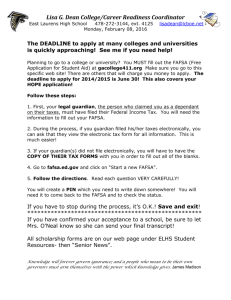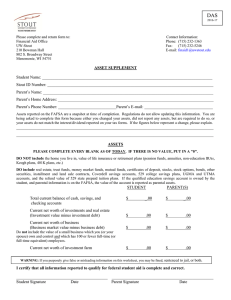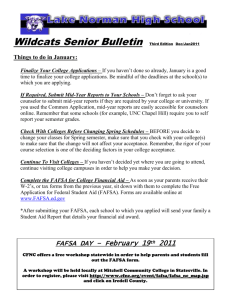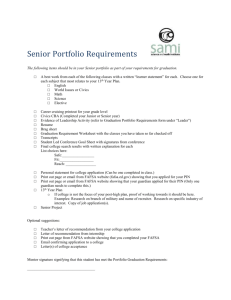FAFSA Completion Project
advertisement
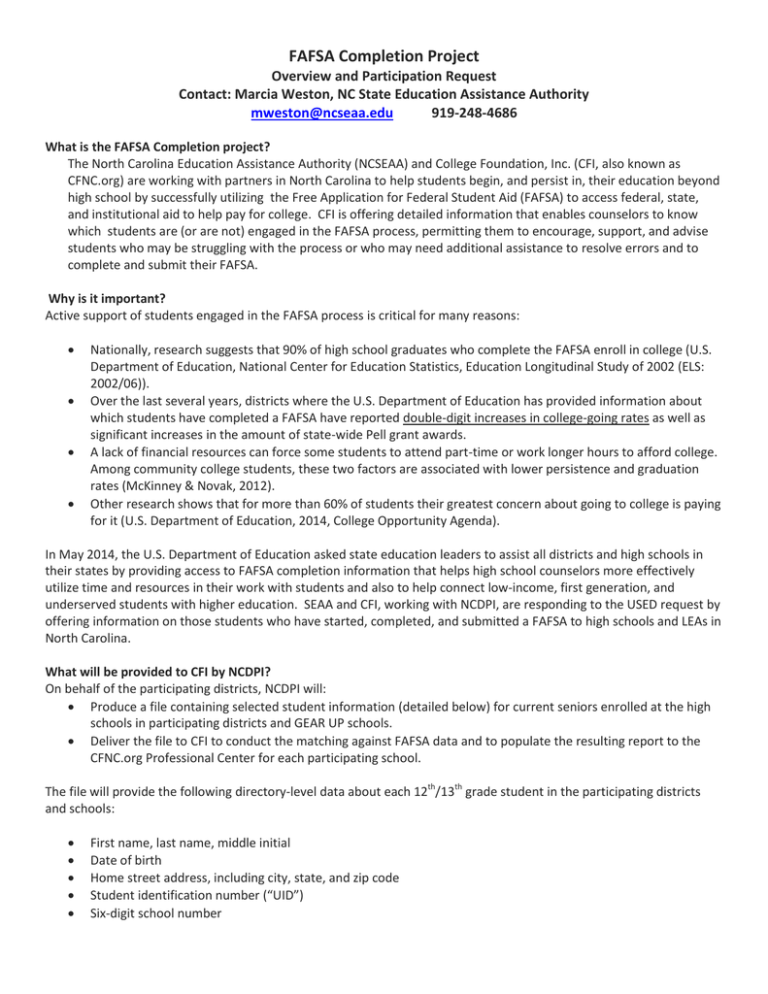
FAFSA Completion Project Overview and Participation Request Contact: Marcia Weston, NC State Education Assistance Authority mweston@ncseaa.edu 919-248-4686 What is the FAFSA Completion project? The North Carolina Education Assistance Authority (NCSEAA) and College Foundation, Inc. (CFI, also known as CFNC.org) are working with partners in North Carolina to help students begin, and persist in, their education beyond high school by successfully utilizing the Free Application for Federal Student Aid (FAFSA) to access federal, state, and institutional aid to help pay for college. CFI is offering detailed information that enables counselors to know which students are (or are not) engaged in the FAFSA process, permitting them to encourage, support, and advise students who may be struggling with the process or who may need additional assistance to resolve errors and to complete and submit their FAFSA. Why is it important? Active support of students engaged in the FAFSA process is critical for many reasons: Nationally, research suggests that 90% of high school graduates who complete the FAFSA enroll in college (U.S. Department of Education, National Center for Education Statistics, Education Longitudinal Study of 2002 (ELS: 2002/06)). Over the last several years, districts where the U.S. Department of Education has provided information about which students have completed a FAFSA have reported double-digit increases in college-going rates as well as significant increases in the amount of state-wide Pell grant awards. A lack of financial resources can force some students to attend part-time or work longer hours to afford college. Among community college students, these two factors are associated with lower persistence and graduation rates (McKinney & Novak, 2012). Other research shows that for more than 60% of students their greatest concern about going to college is paying for it (U.S. Department of Education, 2014, College Opportunity Agenda). In May 2014, the U.S. Department of Education asked state education leaders to assist all districts and high schools in their states by providing access to FAFSA completion information that helps high school counselors more effectively utilize time and resources in their work with students and also to help connect low-income, first generation, and underserved students with higher education. SEAA and CFI, working with NCDPI, are responding to the USED request by offering information on those students who have started, completed, and submitted a FAFSA to high schools and LEAs in North Carolina. What will be provided to CFI by NCDPI? On behalf of the participating districts, NCDPI will: Produce a file containing selected student information (detailed below) for current seniors enrolled at the high schools in participating districts and GEAR UP schools. Deliver the file to CFI to conduct the matching against FAFSA data and to populate the resulting report to the CFNC.org Professional Center for each participating school. The file will provide the following directory-level data about each 12th/13th grade student in the participating districts and schools: First name, last name, middle initial Date of birth Home street address, including city, state, and zip code Student identification number (“UID”) Six-digit school number What will be provided to my counselors by CFI? After the FAFSA matching is completed, CFI will: Provide information to authorized users (typically principals and counselors) via their existing CFNC.org Professional Center accounts. These authorized staff in each participating school will be able to view information for their students only. Offer technical and implementation support to those accessing the data. The output is designed to help principals and counselors be aware of students’ interaction with the FAFSA process so that they can better support students as they complete the FAFSA. In particular, CFI plans to provide “plain English” guidance so that counselors can guide students in making needed corrections and completing the FAFSA. Output provided to schools for the 2014-15 school year is expected to be similar to that shown in the table below: Student Name FAFSA Status Error Codes Signed by Student Signed by Parent Submitted Flagged for Verification? How to resolve the error John Rothman Will I. Am Pete Townsend Not started Completed Started N/A None N - Missing first or last name N/A Yes Yes N/A Yes No N/A Yes No N/A No No Geddy Lee Completed R – Student’s SSN match, but no date of birth match Yes Yes No No N/A N/A Correct the Student’s Last Name or First Name or confirm (re-enter the same value) a blank First or Last Name field if the student actually has only one name. Confirm (re-enter the same value) or correct the Student’s Date of Birth. Neil Peart Alex Lifeson Steve E. Nix Completed Completed Not started None None N/A Yes Yes N/A Yes Yes N/A Yes Yes N/A Yes Yes N/A If the date of birth is correct, the student must correct the date of birth on the SAR/ISIR to the same value reaffirming that it is correct. N/A N/A N/A Why am I being contacted about this? NCSEAA and CFI are seeking NC LEAs as possible “early adopters” who are interested in the FAFSA Completion Project as a mechanism to support their current participation in initiatives such as the Financial Empowerment Project and others that include increased FAFSA completion as a goal. Each district that agrees to participate will be required to sign an agreement designating DPI to provide its list of students for matching and allowing NCSEAA/CFI to provide the federal data to high schools. NCSEAA/CFI will honor all FERPA requirements and "opt out" requests filed by parents with the LEA. The LEA will determine which students should be excluded from the list of seniors prior to CFI receiving the list from DPI, filtered to remove those students who have opted out. In the future, CFI would like to solicit feedback from school-level users so that we can improve delivery of FAFSA data in a way that makes it more useful for them in future years.

